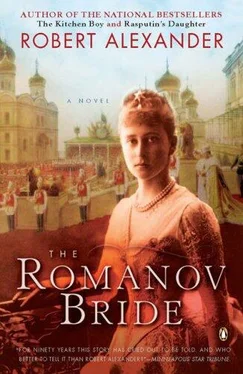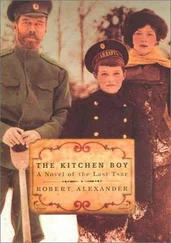Oh, if only the Tsar had been waiting for us…
It wasn’t long at all before we reached the great Petergofskoye Highway and turned north. By this time Father Gapon himself was no longer in the front rank but just behind, surrounded by a handful of what appeared to be bodyguards, big men who kept close and tight rank around him. Shura and I were not but three or four people away from this group, and it wasn’t long before the Narva Triumphal Arch, built to welcome home the troops from their victory over Napoleon, came into view. But what caught my attention wasn’t the glorious copper arch or the copper chariot with six ponies atop. No, what seized my heart was the sight of kneeling troops, rifles at the ready, blocking our passage over the small bridge spanning the Tarakanovka River in front of the arch.
“Shura,” I muttered, “there are soldati ahead.”
Still holding the Tsar’s portrait aloft, my dear wife, along with the crowd, was now singing “Our Father” and seemed barely concerned. In fact, she and everyone else only began to sing louder. But it scared me, I confess, and a shiver went through my body when I saw behind the troops a line of cavalry-men mounted on horseback, their faces stern, their fur hats tall. Oh, dear Mother of God, I thought. All we had wished for was that our meager voices be heard by our rightful ruler, not that the Cossacks be brought in.
“Shura,” I said, taking my young pregnant wife by the arm, “perhaps we shouldn’t be here, perhaps we-”
“Don’t worry, Pavel!” she said, holding the portrait higher.
“But-”
“It’s all right. Trust me, no one would dare fire at a picture of the Tsar!”
Instinctively I started to slow, for like all peasants of Russia -serfs that we had so recently been-there was nothing I feared more than my master’s whip. But these stout men atop their horses did not bear whips. No, it was far worse, for at their sides were swords. But whatever the danger, there was no stopping our mighty procession now. Even though I tried to slow my pace, I could not. Indeed, the great mass of humanity seethed with excitement, pushing me forward faster and faster.
When we were but 300 paces away, the line of kneeling troops suddenly parted and the Cossacks came roaring out on their small, strong horses.
“Gik! Gik!” they cried as they spurred on their horses.
Thanks be to God, though, their swords were still not drawn, and yet a great shout arose from all of us, and our procession parted down the middle. It was through this empty alley that the Cossacks charged, their horses bellowing steam like dragons as they thundered across the trampled snow. Yes, we parted for the Cossacks, but we did not disband, we did not scatter down side streets, as I am sure was the desire of the soldiers.
Father Gapon, his voice shaking, bellowed, “Be brave, Brothers! Freedom or death!”
All of us stood in shock as we watched the Cossacks pass through the entire crowd and then, like a great eagle, circle back. Because we had not fled, an order was given. In one lightning move, the Cossacks drew their shashki-their famous swords-and came charging back faster than before.
“Gik! Gik!” they shouted.
It was a dazzling sight, these brutes on horseback, the silvery metal of their shashki glinting in the golden winter sun. We pulled back even more, and again there was no incident as they surged past, their voices whooping and their swords raised high. They charged back across the small bridge and disappeared behind the line of soldiers.
Immediately, almost instinctively, the great mass of us, so many thousands, rushed back into the street like floodwaters whooshing into a void. My heart was pounding like a locomotive, and though I knew I should be carrying my young pregnant wife out of the way, I couldn’t stop myself. We were great, we were mighty, we workers so desperate for a good life, and all of a sudden we were locking arms, one to the next, united in our desperation. The singing erupted from us all-what song I can’t even remember, something religious, to be sure-and faster than ever we poured forward, those behind pushing us in the front. When we were less than 200 paces from the line of kneeling soldiers, I heard it, the bugler giving the call to fire. But nothing happened. It came again, the sound trumpeting into the thin winter air. Then a third time, all to no avail, for we were all brothers and sisters, workers and soldiers alike. Finally, I heard the scream of an officer ordering his young men to shoot upon us. And fire they did, the dry snap of their bullets shattering the air. But the rifles that had been aimed directly at us were by then raised to the heavens, firing high overhead. That was the first volley. Then came another order, and the second volley likewise went into the air. And somehow we were running by then, all of us gathering power and courage, our icons and religious banners and certainly the image of the Tsar held high. And I remember looking at the kneeling soldiers, seeing the fear on their young faces. Boys, they were, brought in from some provincial town, Pskov perhaps. Terrified boys who, faced with this mob, lowered their guns and, this time following their orders, took near-point-blank aim.
Again, that dry snap, over and over.
An unbelievable wail rose from our procession, unified at first, then shattering into one scream here, another there. A man not ten paces in front of me suddenly fell to the ground, his religious banner tumbling and ripping to shreds underfoot. I tried to stop but could not, so great was the force of the masses behind us. Glancing over at Father Gapon, I saw the horror in his eyes, then saw two of his bodyguards, the ones right in front of him, stumble and fall. And right above my Shura something exploded into a million pieces and she screamed… she screamed as the portrait of Tsar-Batushka was riddled with bullets.
“Shura!” I cried to the heavens.
There came another volley and yet another as the soldiers fired straight at us, and we all fell to the ground nearly as one, man atop woman, atop grandfather, atop child. Knocked down, I dug into the snowy street as the shots were fired over and over until their clips were completely spent.
At long last the guns were quiet. For the briefest of moments there was nothing. Then came something awful, wailing and sobbing that bubbled up all around me. Lifting my head, I looked around and saw a carpet of bodies. A young girl screamed to the heavens as she reached for her trampled mother. An old man tried to get up, stumbled, and fell again. Turning and looking back, I saw many people now fleeing, cutting into the side streets and running for their lives.
But my dear wife was just lying there, facedown and within reach, and I touched her, calling, “Shura! Shura! Come, we must run away! Get up!”
I scrambled to my feet as best I could and reached out, pulling at her arm. But why was she making no movement, why was she making no effort to get away? Why was she not rising?
“Shura!” I yelled. “Shura, get up!”
It was then that I saw that the snow in which my dear wife was lying was no longer white. No, it was a hot, steaming crimson, and she lay there in it, a rapidly growing sea of red snow, and I realized that I, too, was standing in it, a deep puddle of her blood.
And behind me a man cried like a child, muttering, “God has abandoned us and so… so has the Tsar!”
Sobbing, one of my ladies came in and told me the horrid news, and as soon as I heard it I rushed from my boudoir. Wasting not a moment, I scurried down the grand staircase, my dress dragging behind me, and burst through the doors of Sergei’s cabinet. Hurrying in, I found him not at his desk but gazing out a window at the Kremlin grounds, his hands clasped behind his back. Standing a few steps away was the military governor of the city, our very distinguished Count Shuvalov.
Читать дальше












